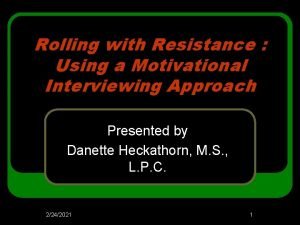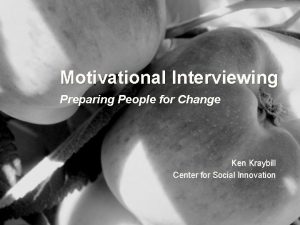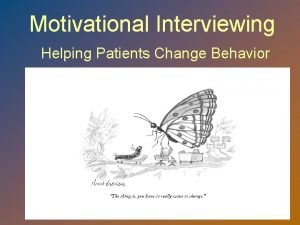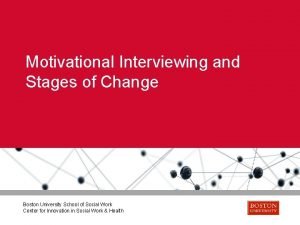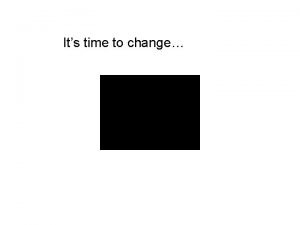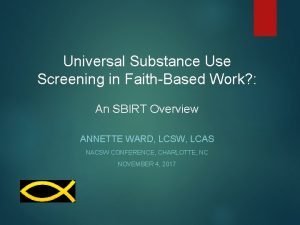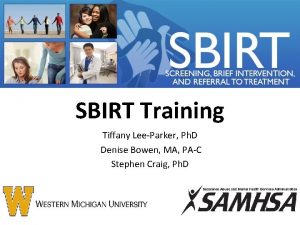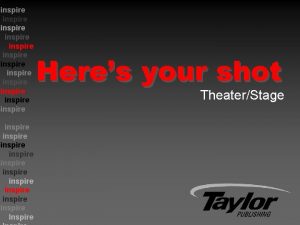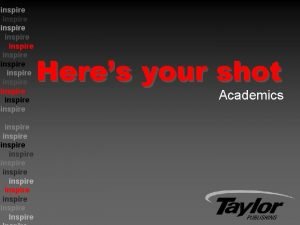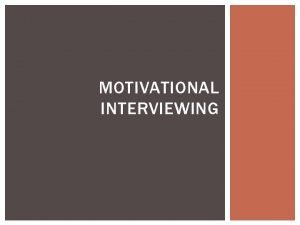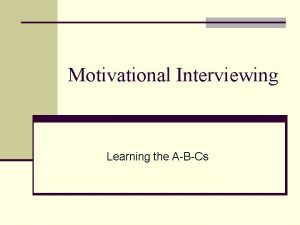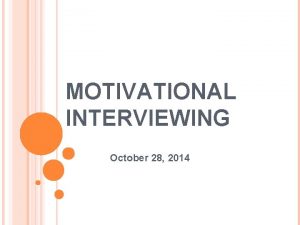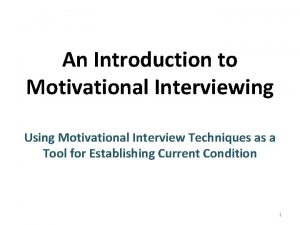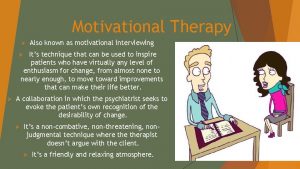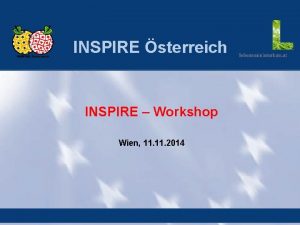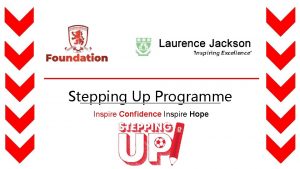The Magic of Motivational Interviewing to Inspire Change




















- Slides: 20

The Magic of Motivational Interviewing to Inspire Change I Students Gina Beyer, Director: Academic Success Programs Amanda Voigt, Course Coordinator: Academic Success Programs Arizona State University

By the end of the session, you will… Be able to explain the basics of brain science and how it relates to the student experience ü Be able to demonstrate the basic skills and practical techniques of Motivational Interviewing (MI) ü Be able to apply MI techniques to the Stages of Change Model ü Analyze student scenarios to determine the best practices for intervention ü

ARIZONA STATE UNIVERSITY Fall 2014 Undergraduate Students with End-of-Semester Cumulative GPA less than 2. 00 UNI 220 Comparison

Arizona State University One-Year Retention Rates for New Transfers on Probation *After the First Semester

To Be Most Effective We Must Understand Ourselves and Others

Our Brains Limbic brain Emotions, Memory, Attention Cortical brain Language, Math, Analysis

“Amygdala Hijacking” Feeling Brain cut off from Thinking Brain Hijacking - Joseph Le. Doux, The Emotional Brain

Intentional vs. Reactive Choice Points

SCARF Neuroscience model All happening below the surface of conscious awareness. . .

The Change Continuum ▪ Precontemplation ▪ “I see no reason to. . . ▪ “I am not interested. ” ▪ Contemplation ▪ “There are (obstacles). ” ▪ “I would but I don’t want (negative outcome). ” ▪ Preparation ▪ “I see the reason for the decision/change. ” ▪ “I’m focusing on it as a priority. ” ▪ Action ▪ “I’m doing the right things to make it happen. ” ▪ “I see what needs to be done. ” ▪ Maintenance ▪ “I’ll (continue to do the behaviors related to change). ”

How (NOT) to help

Motivational Interviewing ▪ Motivational Interviewing is a way of directly communicating that enhances intrinsic motivation to change by exploring and resolving ambivalence ▪ Ambivalence ▪ Two Energies “People are usually better persuaded by the reason which they have themselves discovered than by those which have come into the minds of others. ” – Blaise Pascal

The Basics of MI ▪ Express Empathy ▪ Develop Discrepancy ▪ Roll with ▪ Open-ended Questions ▪ Affirm Resistance ▪ Reflections ▪ Support Self- ▪ Summaries efficacy ▪ Avoid Arguing (The Righting Reflex)

Tried and true… ▪ When precontemplative: ▪ Pros and cons ▪ Information (careful that it is neutral) ▪ When contemplative: ▪ Highlight advantages of change ▪ Affirm the difficulty of change ▪ When preparing: ▪ Be optimistic about change ▪ Focus on strengths ▪ When acting: ▪ Write out plan ▪ Ask what you can do to support

Scenario § Please identify the stage of change and practice your Motivational Interviewing techniques Juan is an advisee in your college who is struggling. He knows that his math skills are an obstacle to succeeding in his major, but is committed to continuing to pursue his current major. He cites family pressure and a high salary career for reasons for his major.

Scenario § Please identify the stage of change and practice your Motivational Interviewing techniques Muhammed was a straight-A student in high school in your major. He came in to see you because you requested a meeting to discuss his 3 mid-term progress reports that are deficient. Muhammed does not feel like he is struggling because he has always been successful before, even when she gets off to a slow start.

Scenario § Please identify the stage of change and practice your Motivational Interviewing techniques Sally is currently on academic probation. She knows that it’s a big deal and is in your office to seek help. Sally isn’t sure how she can be successful, but is looking to you to find out how she can improve her grades.

Many Thanks To… § § § The students – who make all we do worthwhile The ASP Team – the staff and all the faculty who give so much to support students Alicia Hayden and Trudi Vander. Ploeg, ASU Advisors Dean Duane Roen & our ASU Colleagues Audience members NACADA Conference Organizers

Contact Gina. Beyer@asu. edu Amanda. Voigt@asu. edu https: //universitycollege. asu. edu/

References Le. Doux, J. (1996). The emotional brain. New York: Simon & Schuster. Rock, D. (2008). SCARF: A brain-based model for collaborating with and influencing others. Neuro. Leadership Institute. Sobell, L. and Sobell, M. (2008). “Motivational Interviewing Strategies and Techniques: Rationales and Examples. ” Nova Southeastern University: 1 -8. Rollnick, S. and Miller, W. (1995). “What is motivational interviewing? ” Behavioural and Cognitive Psychotherapy. 23, 325334. Prochaska & Climente – stages of change
 Rolling with resistance in motivational interviewing
Rolling with resistance in motivational interviewing Nimi singh
Nimi singh Ken kraybill
Ken kraybill Dares motivational interviewing
Dares motivational interviewing Darn cats motivational interviewing
Darn cats motivational interviewing Motivational interviewing wiki
Motivational interviewing wiki Motivational interviewing dears
Motivational interviewing dears Agreement with a twist motivational interviewing
Agreement with a twist motivational interviewing Amplified reflection motivational interviewing
Amplified reflection motivational interviewing Darn cat motivational interviewing
Darn cat motivational interviewing Motivational interviewing dears
Motivational interviewing dears Stages of change in social work
Stages of change in social work Preparatory change talk examples
Preparatory change talk examples Reds motivational interviewing
Reds motivational interviewing Mi readiness ruler
Mi readiness ruler Darn cat motivational interviewing
Darn cat motivational interviewing Motivational interviewing schizophrenia
Motivational interviewing schizophrenia Darn cat motivational interviewing
Darn cat motivational interviewing German motivational speech
German motivational speech Darn cat motivational interviewing
Darn cat motivational interviewing Motivational interviewing
Motivational interviewing
